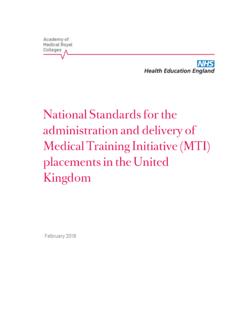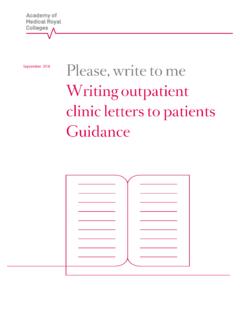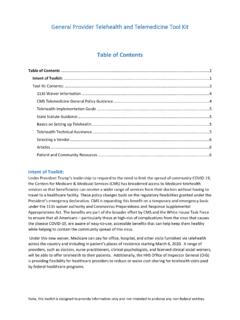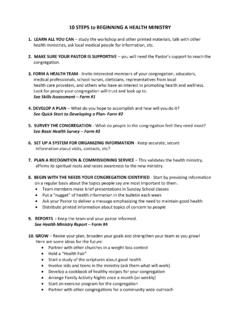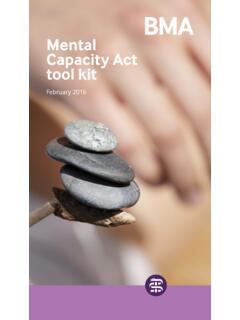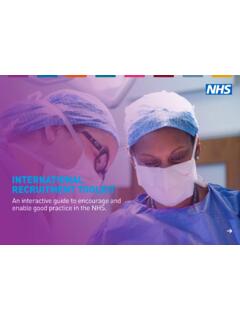Transcription of Academy and COPMeD Reflective Practice Toolkit
1 1 Academy and COPMeD Reflective Practice Toolkit Guidance Note Background The Academy of Medical Royal Colleges (AoMRC), the Conference of Post-Graduate Medical Deans ( COPMeD ), the General Medical Council and the Medical Schools Council have jointly produced guidance on reflection which should be read in conjunction with this Toolkit . These supersede the interim Academy guidance produced in April 2018. Purpose This Toolkit , which contains templates and examples of Reflective styles, aims to facilitate best Practice in the documentation of reflection on a variety of activities and events. It aligns with our joint guidance and previous AoMRC guidance. The templates are suitable for adaptation by Colleges/Faculties. who typically have their own formats. The Toolkit provides different template options that can be used, depending on the aspect of learning to be captured and individual personal preference.
2 Some tools lend themselves to immediate personal reflection whereas others are more useful when some additional perspective has been gained, either through the passage of time or discussion with others. Individuals will have different preferences based on how they learn best. doctors may wish to provide documentation of their reflection on a single event or a summary of their Reflective approach based on several different types of experience. doctors in training are likely to need support to develop the skills to complete reflections, with action points and documented evidence of how learning has been translated into Practice . The process is not a solitary event but one that accumulates the learning, support, advice and teaching into good Practice . Reflective Practice Reflection should be part of a doctor s everyday Practice .
3 Reflective Practice is the process whereby an individual thinks analytically about anything relating to their professional Practice with the intention of gaining insight and using the lessons learned to maintain good Practice or make improvements where possible . This may be a situation the doctor observed, or was directly involved with, or may be part of formal learning which has been particularly poignant or effective. Reflection happens with both positive and negative events learning from activities, either to reinforce behaviour or to change it. As this implies, it can take place during and after the situation. As professionals, doctors should engage in a continuous process of self-assessment as part of personal and professional development. Reflective Practice is part of this process and results in a better understanding of different healthcare situations.
4 The aim of this Toolkit is to aid individual development and to support enhanced performance when similar situations are encountered in the future. 2 For this to be a meaningful process, individuals need to examine their previous beliefs about their Practice . These beliefs are often firmly held, and individuals needs to learn to accept that things can be done differently or better. By continuously evaluating previously held beliefs and assumptions learning occurs and Practice develops. doctors can benefit from challenge in Reflective Practice . Reflections may accurately document thinking that is based on inaccurate beliefs or assumptions which need some challenge. This is the role of an educational supervisor and appraiser. System Learning Reflective Practice should also inform organisational learning to help create system change and development.
5 NHS organisations need to learn and improve by listening to the recommendations that result from individual and team Reflective processes, and by facilitating and promoting system wide Reflective learning. Reflective Practice : an overview Requirements doctors must feel able to have honest and open discussions about clinical events and should be confident that engaging in reflection provides them with a) improved opportunities to learn, b) evidence of a professional approach to self-development, and c) changes leading to improvement of patient care where appropriate. Reflection should not be a detailed description nor an attribution of blame, but should focus on feedback and descriptions of the increased understanding gained which has led to an affirmation of, or change of, Practice . Notes on reflection should thus demonstrate analytical thinking, learning accrued from various sources, including discussion with peers and supervisors, and action planning.
6 The documentation of reflection should, therefore, focus on the learning extracted from an event and should not be a full discussion of the case or situation. 3 This is particularly important in reflections after a significant event as these have a different purpose from the documentation of factual events necessary in the reporting or investigation of serious incidents (SI). There are different ways to reflect and to document those reflections. The GMC does not require any specific documentation, only evidence that it is being carried out effectively. Documentation of reflection can involve writing personal notes in CPD / appraisal portfolios or in training portfolios, or, if reflection is undertaken as part of a dialogue with trainers, this can be recorded as a workplace-based assessment/supervised learning encounter.
7 A written record of reflection may be made at any time. All details of those involved in a Reflective event patients, colleagues, relatives etc must be fully anonymised to comply with confidentiality and information governance requirements. Similarly, precise locations, dates and times should not be specified, and separating the timing of the Reflective documentation of an event and its actual occurrence may help to achieve this. Summary Documented evidence of reflection demonstrates a professional attitude to maintaining Good Medical Practice by showing the ability to learn from and develop one s own and system wide Practice ; take up learning opportunities; and demonstrate the ability to be a responsible self-directed learner. It can be as useful to learn from positive and successful situations as from incidents where care could have been better.
8 August 2018 4 Resources Templates and examples are available through these links: Templates Reflection based on Schon What, Why, How Reflection based on Rolfe et al Reflection based on Gibbs cycle Academy r eflective template What happened, what did you do, what have you learnt, what next Reflective diaries / Logs Team reflection Examples of four incidents that use the differing templates above Incident 1 A near miss Incident 2 Prescribing error Incident 3 WHO checklist incident Incident 4 A communication error These examples demonstrate differences in personal style, in purpose and complexity of the reflection. Different formats work better for different individuals and in different settings, and our examples are useful options for training logs, appraisal portfolios and Reflective notes.
9


